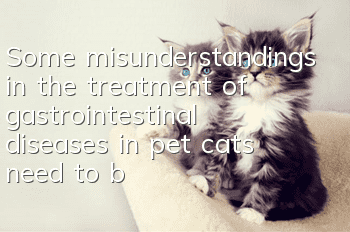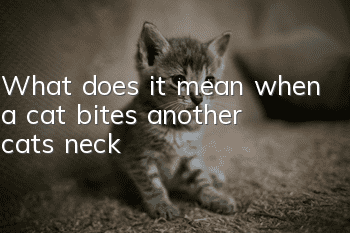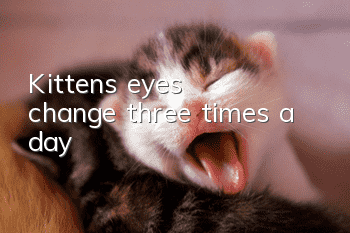Some misunderstandings in the treatment of gastrointestinal diseases in pet cats need to be avoided

The health of the gastrointestinal tract has a great impact on the daily life of pets, but gastrointestinal disease is a relatively common disease, and the older the cat, the higher the chance of getting the disease. And gastrointestinal disease is not a disease that can be solved quickly. It requires timely treatment and long-term conditioning to control or cure it. However, some misunderstandings should be avoided during treatment, otherwise it may get half the result with half the effort and cause some adverse effects.
1. Some cases of diarrhea in cats can be treated by themselves, and it can be solved by taking a few tablets of berberine
Due to the limitations of domestic pet medical conditions, sometimes cats can also use human medicines. However, because cats and people are different, it is necessary to find out which medicines can be used and which medicines are toxic to cats before taking medicine.
Therefore, when we use human medicine to treat cats on our own, we should first consult the veterinarian about which medicine can be used for emergency use in cats and what the dosage is. Safe medication is closely related to your cat’s health, so you must be cautious and cautious!
2. During the recovery period, cats can be fed with porridge or rice soup for a long time
Prescription pet food that is nutritionally safe and easy to absorb is what cats need during their illness. We can give pet cats porridge and other food to achieve the conditioning effect in the short term, but if they take rice soup or porridge for a long time, they will suffer from nutritional deficiencies. .
So we should not rely solely on our imagination to determine the needs of cats, or use human experience to deal with problems. Rice soup is a good sick meal for people, but it is wrong for cats who need a lot of protein and may have no appetite during their illness. Reasonable nutritional supplements are the right approach.
3. Cats cannot keep up with their nutrition after diarrhea, so they should eat to supplement their nutrition as soon as possible
Fasting is required in the early stages of treatment for gastrointestinal diseases, otherwise repeated irritation of the gastrointestinal tract will aggravate the condition. Fasting can give the gastrointestinal tract a good rest and help the gastrointestinal mucosa slowly repair. Because when the gastrointestinal tract is dysfunctional, feeding food will cause abnormal fermentation and abnormal digestion of food. On the contrary, it will aggravate the damage to the digestive tract, leading to serious gastrointestinal diseases and even pancreatic problems. Then feed it food slowly, and don't feed too much at first.
4. Long-term consumption of prescription foods will lead to nutritional imbalances. Once the gastrointestinal disease is cured, feeding should be stopped
Cats that are malnourished due to absorptive dysfunction or a weak digestive system should be fed enteral prescription foods for a long time. Compared with ordinary cat food, intestinal prescription food has the following advantages: comprehensive and balanced nutrition; added prebiotics help restore the balance of intestinal flora; DHA/EPA helps resist digestive tract inflammation. The food formula is highly digestible. protein,Ensure maximum digestive safety. The excellent palatability of enteral prescription foods can also promote the food intake of sick cats and promote their recovery. Such a balanced ratio can become a long-term staple food for cats with digestive tract abnormalities. Some cats with poor gastrointestinal problems need to be fed prescription food for a long time to completely and effectively improve soft stools, vomiting and other conditions.
These are common mistakes that we make when treating cats with gastrointestinal diseases. Owners should pay more attention to these points. Cats with gastroenteric diseases must carefully consider their diet before feeding, otherwise it may aggravate the gastrointestinal disease. burden, causing even more adverse effects.
- How to treat skin diseases in kittens
- Why do Havana brown cats need to be neutered?
- Why does Garfield have so many tear stains? What can I do if I can’t wipe away Garfield’s tear stains?
- Can cats eat dog food for emergencies?
- How to care for your pet’s gastrointestinal tract? Come and learn about pet gastroenteritis correctly!
- What should I do if my cat has fleas? How to get rid of them completely?
- How to raise a good-looking Ragdoll cat, what are the feeding methods and precautions?
- How long does a meow need to sleep in a day?
- How to prevent miscarriage in Ragdoll cats
- What should I do if my cat doesn’t like to cut its nails?



